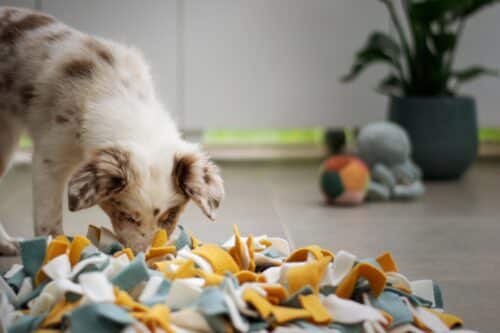Welcoming a new puppy into your home is an exciting and joyful experience. However, it also comes with the responsibility of ensuring their health and well-being. Establishing a routine for your puppy is essential for their development and happiness, and our comprehensive guide will help you create the perfect daily schedule tailored to your pup’s needs. So, are you ready to embark on this life-changing journey with your furry friend?
In this blog post, we will cover essential elements of a daily routine, including meal planning, exercise and playtime, rest and relaxation, house training, socialisation, grooming, and adapting your puppy’s schedule to fit your family’s lifestyle. Our aim is to provide you with useful information and practical tips to make your puppy’s introduction to their new home as smooth and enjoyable as possible, all while establishing routine for your puppy.
Short Summary
- Create a balanced puppy schedule for health, well-being & happiness.
- Establish boundaries & rules to set pup up for success.
- Monitor growth and development while adapting routine to family needs.
Creating a Balanced Puppy Schedule
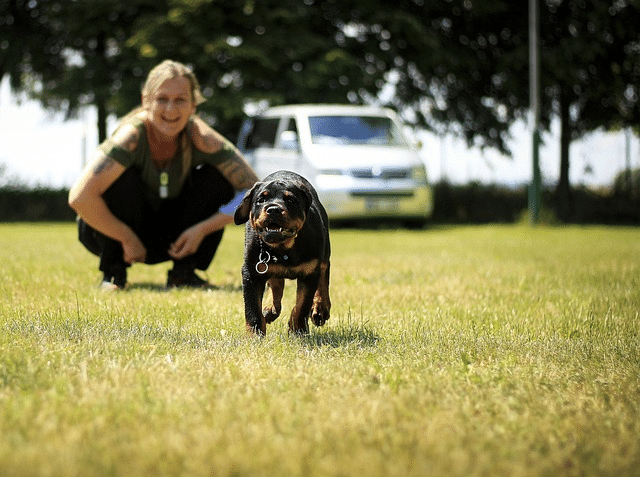
A well-balanced puppy schedule is the cornerstone of your puppy’s health and well-being. By providing structure and consistency, you’ll be setting them up for success in their new life with you. From meal planning to exercise and playtime, and rest and relaxation, we’ll guide you through the essential elements that will contribute to your pup’s overall happiness and development.
So let’s dive in and start creating the perfect daily routine for your new furry family member! Integrating your pup’s schedule into your own can be a breeze if you plan ahead. In the following sections, we’ll discuss meal planning, exercise and playtime, and rest and relaxation in more detail, providing practical tips and guidance on how to create a balanced and flexible routine that works for both you and your puppy.
Meal Planning
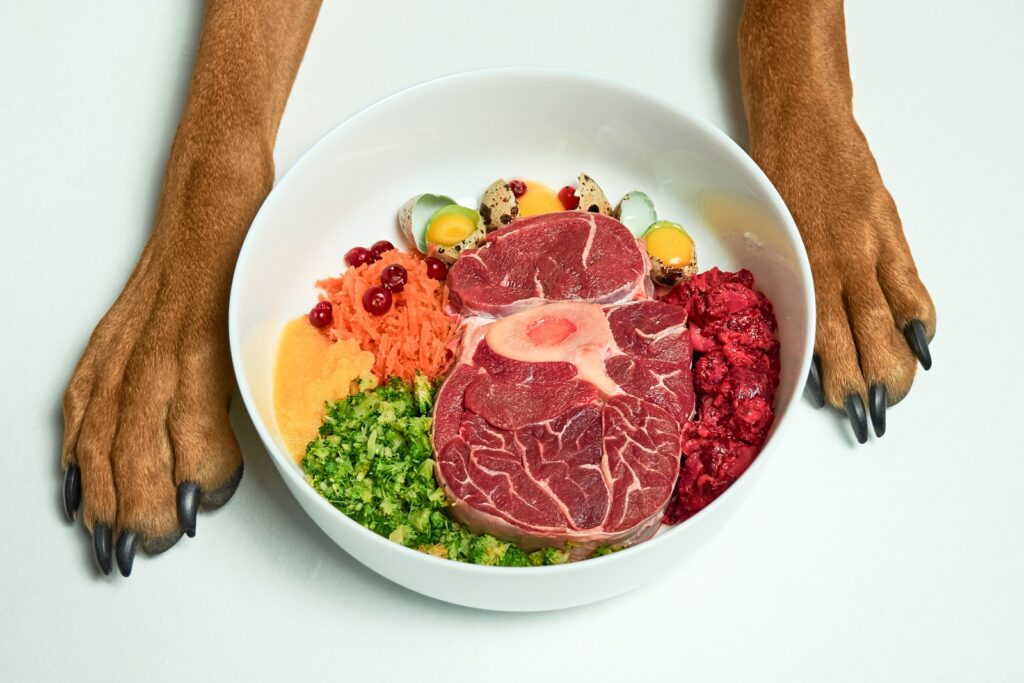
Feeding your puppy the right amount and at the right times is crucial for their growth and overall health. To plan meals effectively, consider their age and size, and divide their daily food intake into regular meals. Young puppies need frequent meals throughout the day, while older puppies can be transitioned to fewer meals as they grow. Remember, fresh water should always be available for your pup to keep them hydrated and healthy.
Consistent feeding times play a key role in successful potty training. By feeding your puppy at the same times every day, you can better predict when they’ll need to go outside for a toilet break. This consistency not only helps with house training but also provides a sense of routine and stability for your growing pup.
Exercise and Playtime
Exercise and playtime are essential for your puppy’s mental and physical development. Engaging in regular play sessions not only helps to burn off their boundless energy, but also provides valuable learning opportunities.
However, it’s important to be mindful of the duration and intensity of exercise, especially for young puppies, to avoid joint damage and other health issues. A general rule of thumb is to provide five minutes of exercise per month of age, up to twice a day. For example, a four-month-old puppy can enjoy two 20-minute play sessions daily.
This moderate amount of exercise ensures your puppy stays healthy, happy, and well-adjusted while growing. Don’t forget to schedule a potty break and some rest time after an active play session!
Rest and Relaxation
While exercise and play are important, rest and relaxation are equally essential for your puppy’s wellbeing. Puppies need plenty of sleep to support their rapid growth and development – typically between 16 to 20 hours a day. Scheduling multiple nap times throughout the day is crucial for maintaining their energy levels and overall health.
Each nap should last between 30 minutes and 2 hours, depending on your puppy’s age and activity level. These restful breaks are also the perfect opportunity to take your pup outside for a quick toilet break before they settle down to sleep.
Remember, a well-rested puppy is a happy and healthy puppy!
House Training Your Puppy
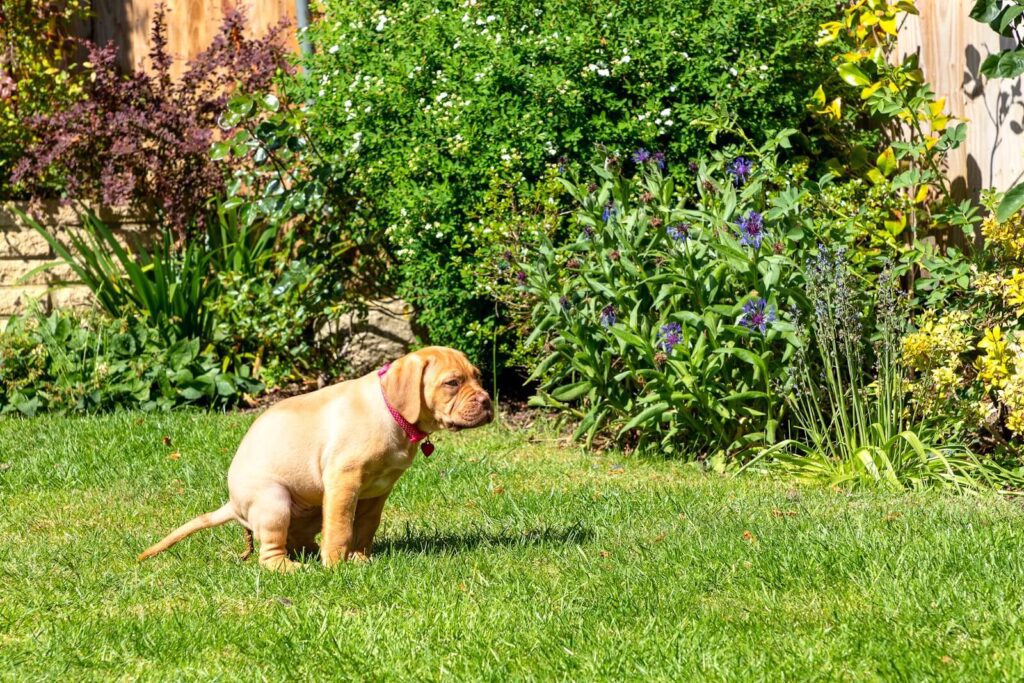
House training is a vital part of your puppy’s development and should begin as soon as you bring them home. Establishing a routine and providing consistency in your puppy’s daily schedule are essential for successful house training.
In this section, we’ll delve into the key components of house training, including potty breaks, crate training, and setting boundaries and rules. By implementing a structured routine, you’ll help your puppy understand and adapt to their new environment, making the house training process smoother and more effective.
So let’s explore each aspect of house training in more detail and set your pup up for success!
Potty Breaks
Scheduling regular potty breaks is crucial for effective house training. Puppies should be taken outside to their designated potty area after sleep, food, water, play, and excitement. Additionally, it’s essential to provide frequent toilet breaks throughout the day, especially during the early stages of potty training.
A helpful guideline to follow is allowing your puppy to hold it for one hour more than their age in months. Puppies can start to control their bladder from a very young age. A three-month-old puppy can last up to four hours without needing to go to the toilet. By scheduling potty breaks based on this rule and your puppy’s daily activities, you’ll set them up for success in the house training process.
Crate Training
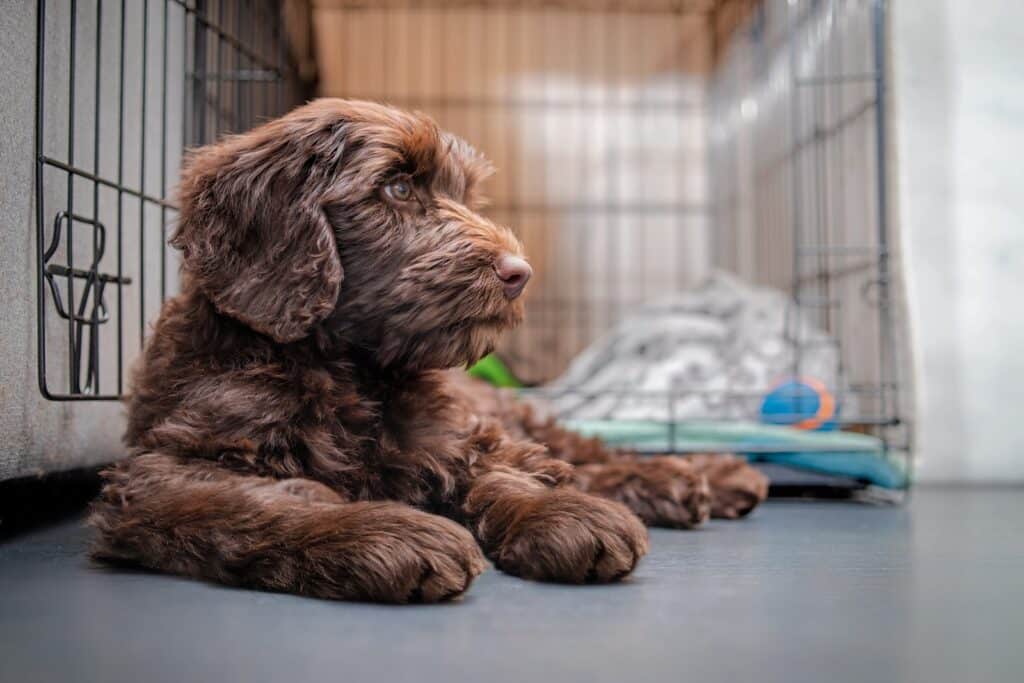
Crate training is an invaluable tool for house training your puppy and creating a safe and comfortable space for them to retreat to when needed. By introducing your puppy to their cage in a positive and gradual manner, they’ll begin to associate it with a sense of security and comfort.
Sticking to a daily routine is also essential for successful cage training. Consistency in feeding, playtime, and potty breaks will help your puppy understand what to expect and adjust to their new environment more quickly. Remember, a well-trained puppy is a happy and confident puppy!
Boundaries and Rules
Setting boundaries and rules before bringing your puppy home is crucial for a smooth transition and successful training. Establishing clear expectations and consistent rules will help your puppy understand what’s expected of them, boosting their confidence and reducing anxiety.
Some essential rules to teach your puppy include not biting, not dominating children or other pets, and not resisting necessary grooming tasks, such as nail trimming. By setting boundaries early on, you’ll provide your puppy with a solid foundation for lifelong positive behavior.
Socialisation and Training sessions

Socialisation and training play a crucial role in your puppy’s development, helping them become well-rounded and confident adults. In this section, we’ll discuss the importance of puppy classes, meeting other dogs, and exploring new environments for your pup’s growth.
By exposing your puppy to various experiences and interactions, you’ll help them adapt to different situations and reduce fear and anxiety. So let’s dive into each aspect of socialisation and training to ensure your pup becomes a well-adjusted and happy member of your family.
Socialisation and Training sessions
Puppy classes provide an excellent opportunity for your pup to learn basic skills, socialise with other dogs, and become familiar with new experiences. These classes often cover essential skills such as investigation, vet visits, playing with other dogs, and introducing them to new sounds and sights.
Participating in puppy classes not only helps with your puppy’s development but it also provides a supportive environment for you to ask questions and connect with other puppy owners. By enrolling your pup in a class, you’ll set them up for success in their social and training journey.
Meeting Other Dogs
Introducing your puppy to other dogs is an essential aspect of socialisation, helping them learn how to interact with other animals in a positive and respectful manner. To ensure a safe and enjoyable experience for your pup, always keep them on a leash and supervise their interactions with other dogs.
Remember that each dog has its personality, and it’s crucial to monitor your puppy’s behaviour and follow their cues during these interactions. By doing so, you’ll help them develop positive relationships with other dogs and set them up for successful social experiences throughout their life.
Exploring New Environments
Exploring new environments with your puppy is vital for their overall development, helping them become familiar with different surfaces, smells, and sounds. By gradually and positively introducing your pup to new environments, you’ll encourage their curiosity and open-mindedness, setting them up for a lifetime of exploration and adventure.
It’s essential to start with familiar, calm environments and use positive reinforcement to build your puppy’s confidence. By exposing your pup to a variety of experiences, you’ll help reduce their fear and anxiety, allowing them to adapt to new situations with ease and resilience.
Grooming and Health Care
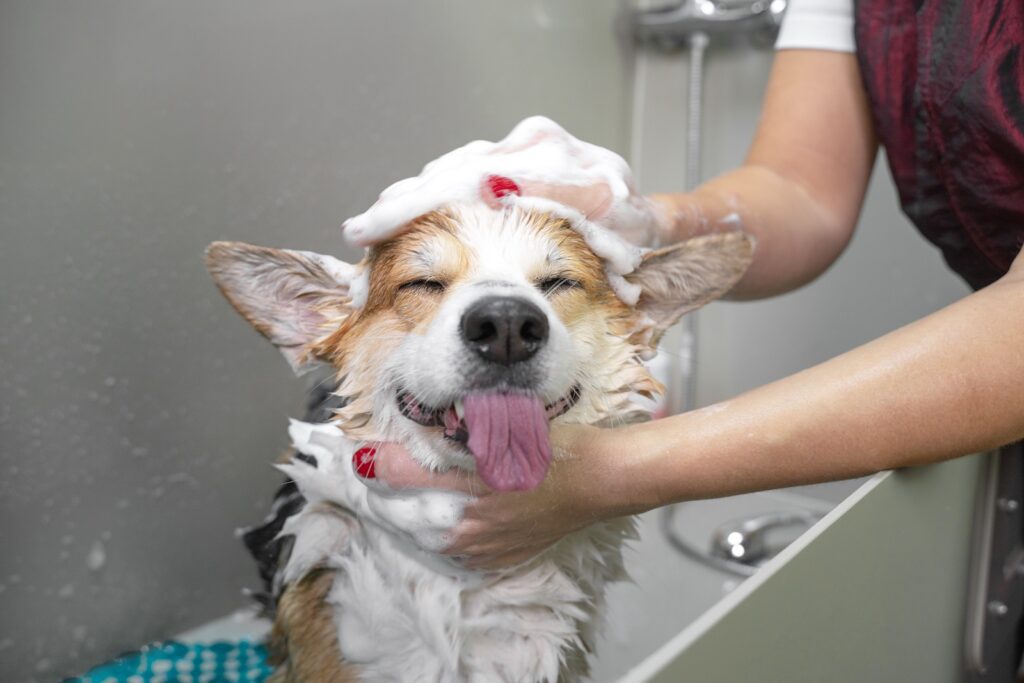
Maintaining your puppy’s grooming and health care is crucial for their overall well-being. By staying proactive in these areas, you’ll ensure your pup looks and feels their best throughout their life. In this section, we’ll cover regular grooming, veterinary appointments, and monitoring your puppy’s growth and development.
Taking care of your puppy’s grooming and health care needs not only keeps them looking and feeling great, but it also helps detect potential health issues early on, allowing you to take action before problems escalate. Let’s explore each aspect of grooming and health care in more detail to ensure your pup stays happy and healthy.
Regular Grooming
Regular grooming sessions are essential for maintaining your puppy’s health and getting them used to being handled. Grooming techniques vary depending on your puppy’s breed, but generally involve shampooing, conditioning, bathing, combing and brushing their hair, clipping hair and nails, and regularly checking their eyes, ears, and teeth.
By introducing your puppy to grooming activities early on, you’ll ensure they’re comfortable with handling, making future grooming sessions easier and more enjoyable for both you and your pup. Remember, a well-groomed puppy is a happy and healthy puppy!
Veterinary Appointments
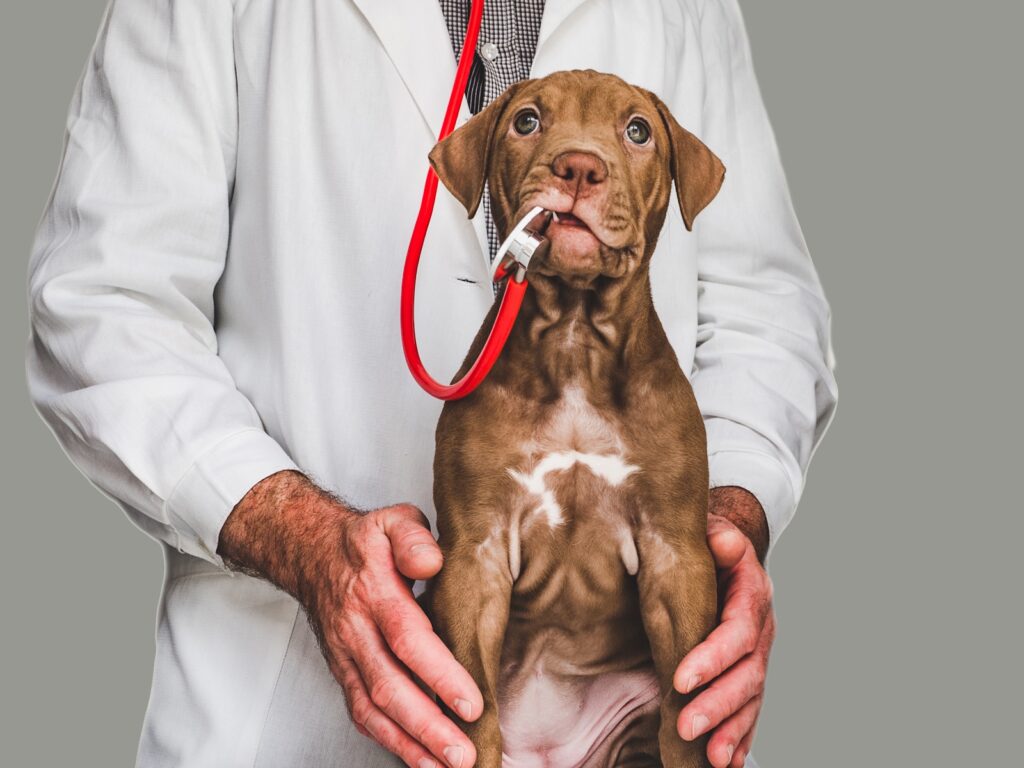
Scheduling regular veterinary appointments is essential for your puppy’s health and well-being. These visits should be based on your puppy’s vaccination schedule, deworming, and routine matters, with additional appointments as needed for specific health concerns.
By staying proactive with veterinary appointments, you’ll ensure your puppy receives the necessary vaccinations, early detection of potential health issues, and the best possible care throughout their life. A healthy puppy is a happy puppy!
Monitoring Growth and Development
Tracking your puppy’s growth and development is an important aspect of their overall health and well-being. Regular weigh-ins and monitoring changes in behaviour can help you stay informed about your pup’s progress and detect any potential concerns early on.
By keeping a close eye on your puppy’s growth and development, you’ll be better equipped to provide them with the appropriate care, nutrition, and exercise they need to thrive. Remember, a well-monitored puppy is a healthy and happy puppy!
Adapting Your Puppy's Schedule
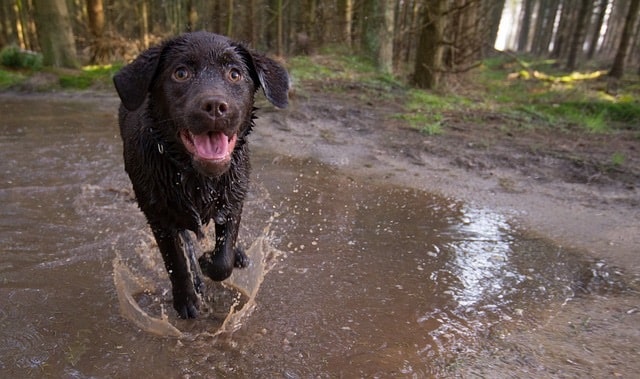
As your puppy grows and your family’s needs change, it’s essential to adapt your puppy’s schedule to ensure their continued growth and development. In this section, we’ll discuss adjusting your puppy’s schedule based on their growth and development, accommodating your family’s schedule, and hiring pet professionals when needed.
By staying flexible and adapting your puppy’s schedule as necessary, you’ll ensure they receive the best possible care and support throughout their life. Let’s explore each aspect of adapting your puppy’s schedule in more detail to help you create a routine that works for both you and your pup.
Growth and Development
Monitoring your puppy’s growth and development is crucial for their health and overall well-being. Regular weigh-ins and tracking changes in behaviour will help you stay informed about your pup’s progress and detect any potential concerns early on.
By keeping a close eye on your puppy’s growth and development, you’ll be better equipped to provide them with the appropriate care, nutrition, and exercise they need to thrive. Remember, a well-monitored puppy is a healthy and happy puppy!
Family Schedules
It’s essential to consider your family’s schedule when creating your puppy’s daily routine. By developing a flexible puppy schedule that accommodates both your needs and your puppy’s, you’ll ensure their continued growth and happiness.
When creating a routine that works for everyone, consider checking in with each other daily and adjusting the schedule as needed to accommodate any changes or special events. Involving everyone in the process and scheduling downtime will help foster collaboration and ensure that your puppy’s schedule is well-balanced and adaptable.
Hiring Pet Professionals
If you find that you’re unable to meet some of your puppy’s needs yourself, consider hiring a pet professional to help with their schedule. Pet professionals can assist with various tasks, such as training, grooming, and providing care when you’re not available.
By enlisting the help of a trusted dog trainer, you’ll ensure your puppy receives the highest quality care and attention, even when you’re unable to be there. Remember, a well-supported puppy is a happy and healthy puppy!
Summary
Establishing a routine for your puppy is essential for their health, happiness, and overall well-being. By following our comprehensive puppy training guide and incorporating the essential elements of a daily routine, you’ll set your pup up for success and create a strong foundation for their lifelong development.
So embrace this exciting journey with your furry friend, and remember that a well-balanced and adaptable schedule is the key to a happy, healthy, and well-adjusted puppy. The love, care, and attention you provide them today will lay the groundwork for a lifetime of companionship, joy, and adventure.
Frequently Asked Questions
To establish a routine for your new puppy, set aside specific times for activities such as feeding, pottying, playtime, socialisation and learning time, and rest. Incorporate regular training sessions in short intervals before meals.
Finally, take your pup outside every two to four hours or after every change of activity.
It usually takes around three weeks for puppies to start settling into a routine and their new home.
It typically takes up to three weeks for a puppy to get used to a routine and start feeling comfortable in their new home. With consistency, patience and lots of positive reinforcement, you will soon have a pup who’s settled into their routine and is thriving with it.
Establishing a bedtime routine for your puppy requires giving them plenty of exercise during the day, having a consistent bedtime schedule, providing a comfortable bed or crate for them to sleep in, making sure their environment is dark and quiet at night, limiting water intake a couple of hours before bed, and taking them out to potty in the middle of the night and first thing in the morning.
With this combination, you can help your pup develop healthy sleeping habits.


